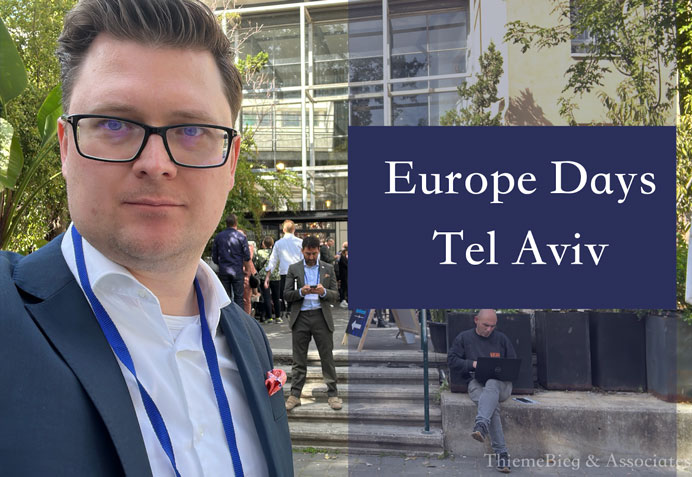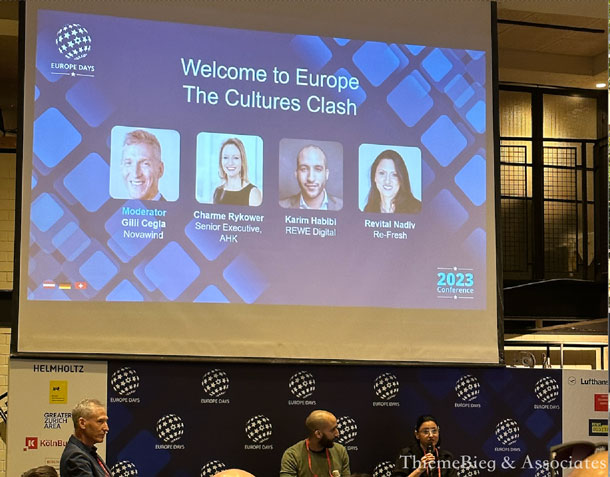The Europe Days in Tel Aviv is a conference for networking between European and Israeli companies from the technology sector. The conference contains startups, investors, established companies. ThiemeBieg & Associates attended this year’s conference with Managing Director Patrick Bieg as part of the delegation of the German Association of Small and Medium-Sized Businesses (BVMW), and learned about innovations and collaborations in the field of cybersecurity and resilience. In addition to the Europe Days conference, other companies were visited in Israel to gain a better understanding of the cybersecurity ecosystem.
Our focus at the conference was on technological innovations, with the aim of being able to offer these as services to our existing European customers ourselves or through new partners in the long term. Israeli companies are leaders in securing digital infrastructures and platforms. Current trending topics are real-time threat monitoring and real-time risk exposure analysis based on current infrastructure, as well as real-time securing of APIs.
Cybersecurity in Europe today predominantly means the implementation of classical cybersecurity governance through control frameworks such as ISO27001 (Annex A) or NIST, or the testing of known vulnerabilities according to OWASP. In addition, PenTests are regularly performed on critical systems.
Linking the defense infrastructure and civilian economy:
A significant portion of innovations as well as entrepreneurs in cybersecurity come from the military or have a military background. The military is thus a key incubator for new technologies and companies in the cybersecurity field. In contrast to civilian cybersecurity, in the military environment not only the capabilities for protection (“threat protection”), but also the capabilities for rapid response (“threat response”) and targeted counterstrikes (“strike back”) are needed and are being developed. These innovations often find their way into civilian use via startups.
Cybersecurity as a national mission & support for critical sectors and critical infrastructure:
Israel is currently working on a digital version of the Iron Dome, the “Cyber Iron Dome”, among other things. The government is also working intensively on systemic cyber resilience, the consolidation of critical infrastructure protection with the assistance of the National CyberSecurity Agency (NCSA), with Cyber Emergency Response Teams (CERTs) specializing in specific sectors of the economy, which intervene in the event of events. In contrast to Europe, we therefore see not only the protection (“robustness”), but strengthen the operational side of incident response and active and passive defense measures. In addition, cybersecurity research is actively conducted at 7 Cyber Research Centers, with over 500 scientific papers published during the last years.
Basic awareness of physical security and cybersecurity:
In Israel, there is a different basic awareness of security due to the ongoing conflict situation and the compulsory military service for men and women. Cybersecurity is also taught at an early stage in schools and universities, thus continuously raising awareness of digital security.
https://www.gov.il/BlobFolder/news/international_strategy/en/Israel%20International%20Cyber%20Strategy.pdfIn Israel, the topic of cybersecurity is a strong focus of politics and business; the Israeli government lists 5 goals in its cybersecurity strategy: Technological goals, especially “security by design”; Economic goals to build trust, reduce financial damage, and cybersecurity as a growth engine; Increasing National Security; Social goals and social participation; as well as International (political) goals. In the area of implementation, a significant part is on “operational response”: the holistic view of the cybersecurity cycle in Europe mostly includes only threat detection and analysis in the area of governance, taking passive measures to secure and recover; in Israel, we strongly see active measures to eliminate threats and mitigate cybercrime. We see considerable potential here for European companies, especially in the critical infrastructure sector, to expand their active defense against cybercrime.


At the conference, there were other interesting presentations and panel discussion on topics ranging from cooperation between German and Israeli companies to cultural differences in cooperation, scaling of cooperations and joint market development. At the networking event, we were able to meet several interesting companies and potential partners.
